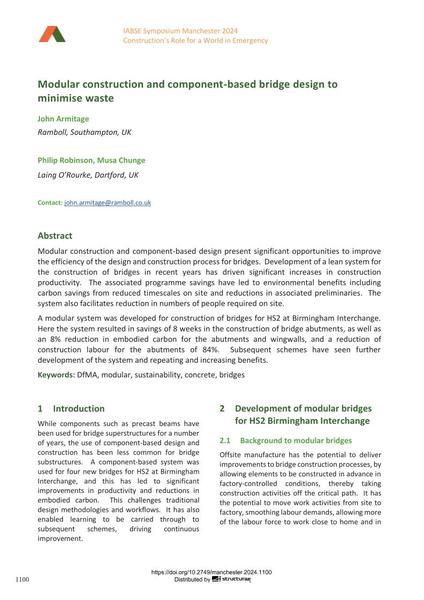Modular construction and component-based bridge design to minimise waste

|
|
|||||||||||
Détails bibliographiques
| Auteur(s): |
John Armitage
(Ramboll, Southampton, UK)
Philip Robinson (Laing O’Rourke, Dartford, UK) Musa Chunge (Laing O’Rourke, Dartford, UK) |
||||
|---|---|---|---|---|---|
| Médium: | papier de conférence | ||||
| Langue(s): | anglais | ||||
| Conférence: | IABSE Symposium: Construction’s Role for a World in Emergency, Manchester, United Kingdom, 10-14 April 2024 | ||||
| Publié dans: | IABSE Symposium Manchester 2024 | ||||
|
|||||
| Page(s): | 1100-1107 | ||||
| Nombre total de pages (du PDF): | 8 | ||||
| DOI: | 10.2749/manchester.2024.1100 | ||||
| Abstrait: |
Modular construction and component-based design present significant opportunities to improve the efficiency of the design and construction process for bridges. Development of a lean system for the construction of bridges in recent years has driven significant increases in construction productivity. The associated programme savings have led to environmental benefits including carbon savings from reduced timescales on site and reductions in associated preliminaries. The system also facilitates reduction in numbers of people required on site. A modular system was developed for construction of bridges for HS2 at Birmingham Interchange. Here the system resulted in savings of 8 weeks in the construction of bridge abutments, as well as an 8% reduction in embodied carbon for the abutments and wingwalls, and a reduction of construction labour for the abutments of 84%. Subsequent schemes have seen further development of the system and repeating and increasing benefits. |
||||
| Mots-clé: |
béton ponts durabilité
|
||||
